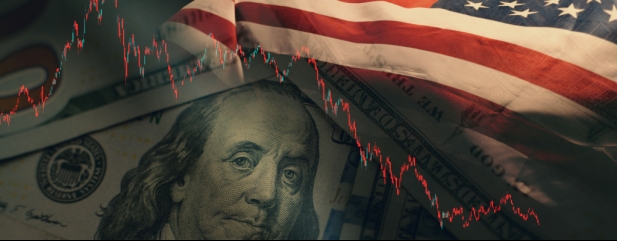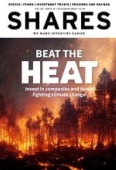Archived article
Please note that tax, investment, pension and ISA rules can change and the information and any views contained in this article may now be inaccurate.
Why forecasters are dumping US recession predictions en masse

Increasing numbers of forecasters are now predicting that the US economy will not suffer a recession this year, even in the face of US debt being downgraded.
Fitch Ratings downgraded its US debt rating on 1 August from the highest AAA rating to AA+, citing ‘a steady deterioration in standards of governance’. The downgrade comes after lawmakers negotiated up until the last minute on a debt ceiling deal earlier this year, risking the nation’s first default on government bonds.
Yet economists at several leading investment banks are now predicting a ‘no landing, no recession’ scenario in the US, including Goldman Sachs, Bank of America, and JPMorgan Chase.
This is instead of the so-called soft landing of a mild downturn and moderating inflation.
JPMorgan Chase economists scrapped their call for a recession in the US in early August, joining a growing number of forecasters who now expect the economy to avert the downturn that was once viewed as inevitable. The bank, which had previously said it expected a recession to begin in 2023, now sees continued expansion this year and ‘modest, sub-par growth’ in 2024 as the most likely scenario.
Michael Feroli, JPMorgan’s chief US economist, flagged the rising possibility of ‘healthy non-inflationary growth’ thanks to potential productivity gains from artificial intelligence and a pickup in employment data.
‘The probability of a US recession in the coming year has declined, as the risk of a disruptive debt-ceiling fight has disappeared and stress in the banking sector appears to be only a modest drag on the economy,’ Goldman Sachs economists said.
The investment bank’s forecasters say there’s a 25% chance of recession in the next 12 months, down from their earlier projection of 35% shortly after the failure of Silicon Valley Bank in March.
Economists and analysts have been predicting a downturn in the US economy for a more than a year, mostly due to high inflation and the steps policymakers have been taking to curb it. Officially, a downturn is defined as a decline in gross domestic product for two consecutive quarters.
Yet economic data continues to be supportive. The unemployment rate is still at ‘near all-time lows,’ Bank of America noted. The most recent (4 August) jobs report showed the unemployment rate was 3.5% based on new July data, ‘just above the lowest level since late 1969’. This has also led to speculation the Federal Reserve will hold rates at a higher level for longer.
Unemployment and other factors – growth in economic activity, wage and price pressures in the ‘right direction’ – prompted Bank of America to reassess its previous calls for a mild recession in 2024. The investment bank is weighting those baseline expectations for a soft landing at 45% to 50%, although it accepts that other outcomes are still possible.
Important information:
These articles are provided by Shares magazine which is published by AJ Bell Media, a part of AJ Bell. Shares is not written by AJ Bell.
Shares is provided for your general information and use and is not a personal recommendation to invest. It is not intended to be relied upon by you in making or not making any investment decisions. The investments referred to in these articles will not be suitable for all investors. If in doubt please seek appropriate independent financial advice.
Investors acting on the information in these articles do so at their own risk and AJ Bell Media and its staff do not accept liability for losses suffered by investors as a result of their investment decisions.
Issue contents
Editor's View
Feature
Great Ideas
News
- Investors are proving to be wary about new US float SharkNinja – here's why
- Why forecasters are dumping US recession predictions en masse
- What do Wilko’s woes mean for retail property shares?
- Insurance giant Aviva set to deliver on its growth targets
- Ukrainian miner Ferrexpo down 82% in two years on the stock market
- Marks & Spencer share price at highest level since January 2022
 magazine
magazine








